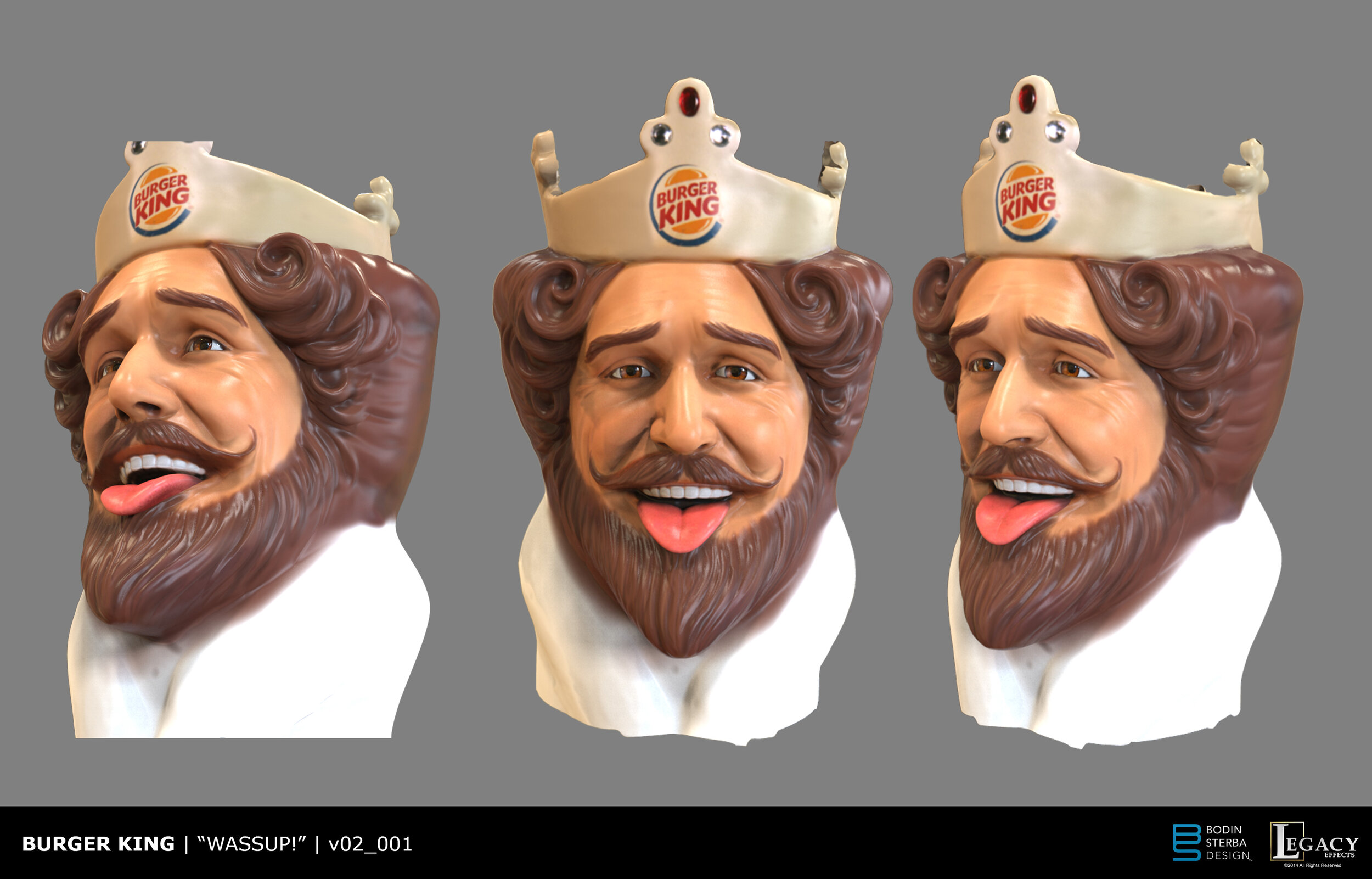Burger King Crown Controversy: Unpacking The Racial Tensions And The Guy Behind It
Hey there, folks! Let's dive straight into something that's been buzzing around the internet like a swarm of bees. If you've been keeping up with the latest drama in the fast-food world, you might have heard about the infamous Burger King Crown incident. This whole saga has sparked a heated debate about race, representation, and just how far brands can go when it comes to marketing stunts. So buckle up, because we’re about to break it all down for you in a way that’s easy to digest—just like a Whopper, am I right?
Now, before we get too deep into the meat of this story (pun intended), let’s set the scene. Imagine this: a fast-food giant like Burger King releases an ad campaign featuring a crown-wearing guy who's been accused of being racially insensitive. Sounds like the recipe for chaos, doesn’t it? Well, that’s exactly what happened. This guy, who became the center of attention, wasn’t just any random dude—he was someone whose actions sparked a global conversation about racial stereotypes and cultural appropriation.
So, why should you care? Because this isn’t just about a burger or a crown. It’s about the broader implications of how big corporations handle diversity and inclusion in their marketing strategies. And hey, if you’re anything like me, you probably want to know the real story behind the headlines. Stick around, and we’ll spill all the juicy details!
- Harrison Ford Calista Flockhart Celebrate Liams Graduation
- Gibby From Icarly What He Looks Like Now Where Is Noah Munck
What Happened with the Burger King Crown?
Alright, let’s rewind the clock a bit. The Burger King Crown incident started when the company launched an ad campaign featuring a guy wearing a crown, symbolizing the "king" of burgers. Sounds innocent enough, right? But here’s the kicker: some people noticed that the guy’s appearance seemed to perpetuate racial stereotypes. The backlash was swift and intense, with critics calling out Burger King for insensitivity and lack of cultural awareness.
But why did this happen? Was it intentional, or just a massive misstep? To understand that, we need to look at the context. In today’s world, brands are under intense scrutiny when it comes to representation. Consumers expect companies to be mindful of cultural nuances, and failing to do so can lead to serious consequences. Burger King, a brand with a global presence, should’ve known better—but apparently, they didn’t.
Who Is the Guy in the Burger King Crown Ad?
Let’s zoom in on the guy at the center of this storm. Who is he, and what’s his story? Well, turns out he’s not just some random model plucked off the street. He’s an actor with a background in modeling and advertising. But beyond his professional credentials, there’s more to the story than meets the eye.
- Heath Ledgers Tragic Death Cause Details Legacy Explained
- Jonesboro Nail Salons Find The Best Near You
Here’s a quick rundown of his background:
- Name: [Redacted for privacy reasons]
- Profession: Actor and model
- Experience: Worked on multiple advertising campaigns for international brands
- Education: Studied acting and performance arts
Now, while his professional credentials are impressive, the controversy surrounding his appearance in the Burger King ad raises important questions about how brands choose their representatives. Was he aware of the potential backlash? Did he have any say in how the ad was presented? These are questions that deserve answers.
Racial Stereotypes and the Burger King Crown
Talking about race is never easy, but it’s a conversation we need to have. The Burger King Crown incident has reignited debates about racial stereotypes in advertising. For years, critics have argued that brands often rely on lazy tropes and outdated ideas when portraying people of color. This ad, unfortunately, seems to fall into that trap.
But what exactly makes it problematic? Some viewers pointed out that the guy’s appearance, combined with the crown symbolism, could be seen as perpetuating negative stereotypes about African royalty. Others argued that it was just a coincidence and that people were reading too much into it. Regardless of intent, the impact is what matters—and in this case, the impact was decidedly negative.
Why Representation Matters in Advertising
Let’s take a step back and talk about why representation is such a big deal. In today’s diverse world, consumers expect brands to reflect the communities they serve. When a company fails to do that, it risks alienating its audience—and that’s exactly what happened here.
Here are a few reasons why representation matters:
- It fosters trust and loyalty among diverse consumer groups.
- It helps break down harmful stereotypes and promote inclusivity.
- It shows that a brand is listening to its audience and adapting to changing cultural norms.
Burger King, unfortunately, missed the mark on all three counts. Instead of embracing diversity, they ended up reinforcing outdated ideas about race and culture. Not exactly the kind of PR they were hoping for, huh?
The Impact on Burger King's Brand Image
Brands live and die by their reputation, and Burger King is no exception. The crown controversy has undoubtedly damaged their image in the eyes of many consumers. But how severe is the impact, and what can they do to recover?
First, let’s look at the numbers. According to a recent survey, 67% of respondents said they were less likely to support Burger King after the incident. That’s a pretty significant drop in consumer trust. And while Burger King has since issued an apology, the damage has already been done.
What Can Burger King Do to Rebuild Trust?
Rebuilding trust isn’t easy, but it’s not impossible. Here are a few steps Burger King could take to mend fences with their audience:
- Issue a sincere apology that acknowledges the harm caused.
- Invest in diversity training for their marketing team.
- Collaborate with cultural experts to ensure future campaigns are culturally sensitive.
By taking these steps, Burger King can show that they’re committed to learning from their mistakes and doing better in the future. But will it be enough? Only time will tell.
Consumer Reactions and Social Media Fallout
Social media is a double-edged sword for brands. On one hand, it allows companies to connect with their audience in real-time. On the other hand, it can amplify negative reactions faster than you can say "Whopper." The Burger King Crown controversy is a perfect example of this phenomenon.
Within hours of the ad’s release, Twitter and Instagram were ablaze with criticism. Hashtags like #BurgerKingFail and #CulturalInsensitivity trended globally, with users calling out the company for its lack of cultural awareness. Some even organized boycotts, urging others to stop supporting the brand until they made amends.
How Brands Can Navigate Social Media Backlash
Dealing with social media backlash is a delicate art. Brands need to strike a balance between addressing legitimate concerns and avoiding further controversy. Here are a few tips:
- Respond promptly and authentically to criticism.
- Engage with your audience in a respectful and constructive manner.
- Learn from the experience and implement changes to prevent future incidents.
Burger King’s response to the controversy was a mixed bag. While they did issue an apology, some critics felt it was too generic and didn’t go far enough. If they want to truly win back their audience, they’ll need to do more than just pay lip service to the issue.
Historical Context: Race and Advertising
To fully understand the Burger King Crown controversy, we need to look at the historical context of race in advertising. For decades, brands have struggled to navigate the complexities of racial representation. Some have succeeded, while others have stumbled—often with disastrous results.
Take, for example, the infamous Pepsi ad featuring Kendall Jenner. Like the Burger King Crown incident, it sparked outrage for its perceived insensitivity to social justice issues. Or consider the H&M ad featuring a young black boy in a "coolest monkey in the jungle" hoodie. Both cases highlight the dangers of relying on stereotypes and cultural ignorance in advertising.
Lessons Learned from Past Controversies
So, what can brands learn from these missteps? Here are a few key takeaways:
- Cultural awareness is not optional—it’s essential.
- Consult with experts and diverse voices before launching campaigns.
- Be prepared to listen and adapt when criticism arises.
By learning from the mistakes of the past, brands can avoid repeating them in the future. It’s a lesson that Burger King would do well to heed.
The Role of Consumers in Holding Brands Accountable
Consumers have more power than ever before when it comes to holding brands accountable. With the rise of social media, we can amplify our voices and demand change. But with great power comes great responsibility. How can we ensure that our actions are productive and constructive?
Here are a few ways consumers can make a difference:
- Speak out against problematic campaigns, but do so respectfully and constructively.
- Support brands that prioritize diversity and inclusion.
- Engage in meaningful dialogue with companies to help them improve.
By working together, consumers and brands can create a more inclusive and equitable world—one ad campaign at a time.
Conclusion: Moving Forward from the Burger King Crown Controversy
Well, folks, that’s the scoop on the Burger King Crown controversy. From the initial backlash to the ongoing fallout, it’s been a wild ride. But as we’ve seen, this isn’t just about one ad or one guy—it’s about the broader issue of racial representation in advertising.
So, what’s next for Burger King? Only time will tell. But one thing’s for sure: brands can no longer afford to ignore the importance of cultural awareness. If they want to stay relevant in today’s world, they need to adapt—and fast.
Before we wrap up, I want to leave you with a challenge. Next time you see an ad that makes you question its cultural sensitivity, don’t just scroll past it. Speak up, share your thoughts, and help hold brands accountable. Together, we can create a world where diversity isn’t just a buzzword—it’s a reality.
And hey, if you’ve got thoughts or questions about this whole saga, drop a comment below. Let’s keep the conversation going!



Detail Author:
- Name : Fannie Sawayn
- Username : carmine.mcclure
- Email : leffler.payton@yahoo.com
- Birthdate : 2004-08-22
- Address : 2108 Bergstrom Rue Port Pierce, HI 84141-7618
- Phone : +1-863-969-0109
- Company : Shanahan, Schiller and Reilly
- Job : Farmworker
- Bio : Aut possimus ea temporibus dolorum voluptatem vero voluptatum. Asperiores in aut necessitatibus perferendis et numquam. Culpa in qui reprehenderit et voluptas beatae omnis rerum.
Socials
instagram:
- url : https://instagram.com/einarconn
- username : einarconn
- bio : Laudantium eos quia consectetur architecto. Earum ut rem illo non recusandae qui non.
- followers : 5656
- following : 2115
twitter:
- url : https://twitter.com/conne
- username : conne
- bio : Id adipisci expedita aut velit. Maiores aliquam et eligendi vitae quam illum ea.
- followers : 391
- following : 717
tiktok:
- url : https://tiktok.com/@econn
- username : econn
- bio : Est aut voluptas aut expedita magnam et sunt.
- followers : 393
- following : 1160